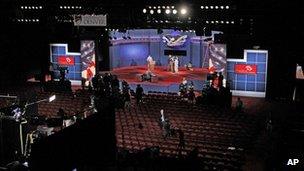Do the US presidential debates matter?
- Published
- comments

The first debate of 2012 is taking place at the University of Denver, in the swing state of Colorado
US President Barack Obama, meet your Republican opponent Mitt Romney. Live. In the flesh.
It is quite a moment.
This ill-tempered US election campaign has largely been about both sides drawing a hideous caricature of their opponent producing endless adverts, stuffed with half-truths and quotations taken out of context.
This is the first chance America has had to look into the eyes of the two men who would be president and to hear what they say to each other, face to face.
The experts I have been talking to say that, yes, in a close election the debates can matter.
What matters most is not the closely drawn intellectual argument about rival policy platforms, but the body language and the pithy one-liner, external that sums up an opponent's faults.
The tone was set by the very first presidential TV debate: John Kennedy vs Richard Nixon in 1960. One commentator at the time said JFK looked like "a bronzed warrior" whereas Tricky Dicky appeared sick, unshaven and sweaty.
Ronald Reagan's put-down of Jimmy Carter in 1979, "There you go again", encapsulated the feelings of many that the incumbent was a bit wordy and long-winded, and allowed Reagan to appear sharp and unthreatening.
Archiving the presidential campaign
Above all, the candidates must avoid blundering, making some stray error of fact or tone that makes them appear ineligible for high office. Avoiding the pitfalls is priority number one.
I am told President Obama sees debates as a "jump-ball" - a moment when a team can grab control of a game from a difficult position.
So he would probably settle, to change sporting metaphors, for a no-score draw.
His conference speech was judged "workmanlike" (by me, among others) and he would probably settle for a similar verdict, external on this debate.
Mr Romney, on the other hand, is behind in most opinion polls - badly so in the vital swing states - and needs a win, external. But the debates serve another purpose.
One of my most interesting recent interviews was with a professor of political communication, Kathleen Jamieson, external, who made the point that while debates only occasionally change minds, they do leave voters much better informed.
She sees that as valuable in itself, an exploration of how candidates would govern - a kind of manifesto in a country that does not go in for manifestos, a promissory note for the next four years, during which one of the two will be in the White House.
I will be tweeting as the debate happens, technology willing, and blogging when it is over.